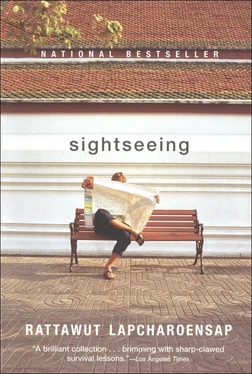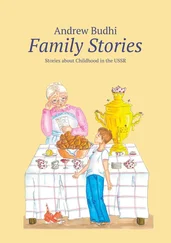Ma, he says. We’ll be late.
She relents, puts her hands in her lap and looks at them sheepishly, as if afraid they’ll spring to life again on their own. Wichu leans down and kisses his mother on the cheek.
Gotta go, he says. See you later, Ma.
His mother kisses him back. And then she kisses me. She is a small woman; she has to grab my forearm, pull me down to her, and teeter on her toes just to peck me on the cheek. This is not the first time she has kissed me as she has kissed her own sons. Years later I will remember her kiss on that draft day morning, the scent of menthol wafting from her shoulders, the way her wet hair sprinkled my cheek, and I will feel like I’m falling from some great and excruciating height and the feeling will refuse to leave me for days.
You two take care of each other now, she says. I’m taking a half-day, Wichu, so I’ll be along to the temple by noon. Don’t pick without me, you hear? Wait until I get there. Tell them you want your mother there to witness it. Think black, Wichu. That’s what we want. Black, black, black, black, black.
And then she goes back inside the house, as if she cannot bear to watch us leave. My own parents, in the meantime, are sleeping soundly in their beds, three houses away.
When Wichu and I arrive at the temple, there’s a crowd of boys lined up inside the open-air pavilion. I’d never seen so many boys be so silent together. We join them there, seat ourselves at the end of the snaking line. Sparrows skitter in the rafters. The ceiling fans whir above us. A few boys eye us silently before turning their attention back to the stage at the front of the pavilion, where military personnel walk back and forth like stagehands preparing for a play. A banner hangs over the stage in the requisite tricolor: PRAVET DISTRICT DRAFT LOTTERY, it announces in bold script. FOR NATION. FOR RELIGION. FOR MONARCHY. Wichu asks me if I’m nervous. I tell him that I am. Wichu says he’s not nervous at all. It’s strange, he says, I’m feeling calm right now. Relaxed. What will happen will happen.
The pavilion has been roped off. Relatives station themselves along the ropes on straw mats and blankets, waving and smiling to their sons, their nephews, their boyfriends, their grandsons, their fathers in some cases. They fan themselves with the day’s paper, eat and drink out of tin canteens. Most of the boys do not acknowledge them, though a few send back weak, assuring smiles. Here and there, men in fatigues walk along the lines, ask the boys questions and jot down notes onto their clipboards. Soft upcountry music has been piped into the pavilion. Wichu taps his fingers absentmindedly to the rhythm. He wants to be a drummer. We’ve been planning to start a rock ’n’ roll band.
When eight o’clock arrives we all stand up and sing the national anthem, followed by the king’s. A monk leads us in prayer. Some of the boys murmur the words. Others furrow their brows intently, close their eyes, and chant loudly along with the monk’s drone, as if the volume of their prayers this morning might matter a great deal. Wichu and I clasp our hands and stare blankly ahead; we’ve already prayed the night before. Afterward, there’s a loud and nervous silence. A middle-aged man in a uniform darker than the others, dozens of colorful insignias pinned to his shoulders and his breast pockets, walks up to the podium. He looks over us as one looks at one’s prized possessions. He’s a four-star general, a promotion away from field marshal. We’ve all seen him on television. He talks into the static-ridden microphone about duty, security, sacrifice, the glory of our great nation, the monarchy’s uncompromising integrity, the freedom we all take for granted. Some of the relatives clap during his speech. Some cheer loudly. Most of us just stare. The papers say the general plans to run for a seat in parliament next year; he waves to the relatives when his speech is over, as if practicing the part, bows to the other military personnel onstage. A younger man walks up to the podium when the general leaves. He informs us that registration will now begin.
There are hundreds of us, perhaps even a thousand. The sun has risen high above the mango grove at the edge of the temple when Wichu and I finally get to the registration table. There, a young woman in a tight-fitting military uniform asks us questions. We produce the required documents for her: birth certificates, proofs of residency, identification cards, driver’s licenses. Wichu’s mother has prepared a whole dossier of other documents and he hands the folder to the woman now: elementary school report cards, doctors’ notes about his asthma, letters of recommendation from the owners of the houses she cleans, Khamron’s honorable discharge, even his father’s certificate of death from the hospital. Wichu’s mother believes that — if given to the right person — these documents might send Wichu home. I notice Wichu shaking imperceptibly when he hands over the folder. The woman looks over the documents, flipping through them quickly. When she’s done, she looks at Wichu like he’s diseased. What is this? she asks impatiently. Wichu shrugs. The woman hands the folder back to him. She tells us both to seat ourselves at the end of another line for the physical exam.
We wait a couple more hours in the physical examination line. The pavilion air has become unbearably hot. More relatives arrive, station themselves by the ropes; it is as if they’ve come together for a picnic or a boxing match. Wichu seems shaken by the encounter with the woman. I try to make small talk, but he just nods and smiles at me demurely.
The boys line up eight at a time at the front of the line. They take off their shirts for the doctors on duty. They look at their feet while the doctors put cold stethoscopes to their chests, examine their ears, teeth, nostrils, check for scoliosis, measure their height, weight, wingspan, waist, chest — their bodies reduced to so many numbers. The doctors’ assistants take notes on their clipboards. Some of the waiting boys jeer and laugh when the fat kids take off their shirts.
Every so often, a doctor gestures to one of the men in fatigues and a boy is told to put on his shirt and go home. When this happens, there is always a bright burst of cheering and clapping among some of the relatives.
A kratoey with heavy makeup wearing a red blouse arrives at the front of the line. When he takes off his blouse, everybody — all the boys waiting in line and all the relatives behind the ropes — laugh and clap and point, even the officers watching from the stage. The kratoey smiles defiantly, his painted face strange on his dark, skinny torso, before bowing to the crowd flamboyantly. I recognize him. The kratoey is a boy named Kitty that Wichu and I knew in high school. Although it is well-known that some boys will arrive at the lottery in drag to try to evade the process, Kitty is not a draft day kratoey. When Kitty passes the physical exam and gets sent to the next line, there is laughter and applause again, and Kitty blows kisses at us all. When the commotion dies down, I hear a boy sitting in front of us say to his friend that we’re all fucked now if that kratoey can pass his physical. The friend grunts and tells the story of his uncle, who had chopped off the tip of his pinky finger to avoid the draft thirty years ago.
He cut it off, the boy says. And they drafted him anyway. Told him he didn’t need a pinky to pull a trigger.
Wichu and I finally arrive at the front of the line. I wonder if I will be sent home now, if this is what the navy lieutenant meant when he told my father that everything would be arranged. But the doctor examines me like all the other boys. We get sent to the next line, take our seats before the stage. We watch the woman who’d registered us set up the lottery urn. We sit and wait for the rest of the boys to be examined. It’s early afternoon now. The doctors pack up their bags, bid the officers good-bye. A man walks to the podium. We’re to take an hour break for lunch before the lottery begins.
Читать дальше











